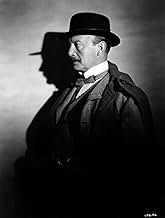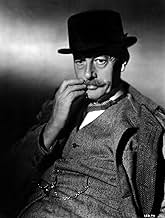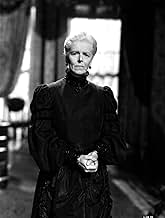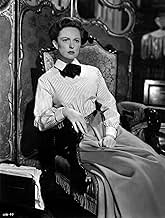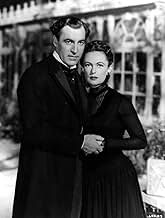After a sickly Victorian woman dies suddenly, a postmortem reveals that her body contains a fatal dose of arsenic. Suspicion falls on her husband and her companion, who are lovers. Inspector... Read allAfter a sickly Victorian woman dies suddenly, a postmortem reveals that her body contains a fatal dose of arsenic. Suspicion falls on her husband and her companion, who are lovers. Inspector Martin of Scotland Yard solves the mystery of her death, over a cup of tea.After a sickly Victorian woman dies suddenly, a postmortem reveals that her body contains a fatal dose of arsenic. Suspicion falls on her husband and her companion, who are lovers. Inspector Martin of Scotland Yard solves the mystery of her death, over a cup of tea.
Irene Arnaud
- Horace's wife
- (uncredited)
Frederick Kelsey
- Mr. Chudleigh
- (uncredited)
Ernest Metcalfe
- Cabbie
- (uncredited)
Sidney Monckton
- Horace
- (uncredited)
Featured reviews
The Obsessed is a nice example of English noir and of the murder mysteries they do so well and with such style. It's a wonderful case study on how suspicious minds can mess with your head.
Schoolmaster David Farrar's wife who's a rich sickly soul is given arsenic poisoning and that brings Scotland Yard in with Inspector Roland Culver. Farrar has been carrying on for some time with Geraldine Fitzgerald who is the wife's companion.
The bulk of the film is spent with Farrar and Fitzgerald each thinking the other did it and trying to keep their relationship intact. Housekeeper Jean Cadell, a nasty old soul is sure it was one of both.
A whole lot of emotions come into play with the scenes of the two leads often at the same time, hope, fear, anger, suspicion all fueled by the wife's poisoning.
As is usual the wise Scotland Yard inspector with some forensic help sorts it all out.
Great acting especially from the two leads.
Schoolmaster David Farrar's wife who's a rich sickly soul is given arsenic poisoning and that brings Scotland Yard in with Inspector Roland Culver. Farrar has been carrying on for some time with Geraldine Fitzgerald who is the wife's companion.
The bulk of the film is spent with Farrar and Fitzgerald each thinking the other did it and trying to keep their relationship intact. Housekeeper Jean Cadell, a nasty old soul is sure it was one of both.
A whole lot of emotions come into play with the scenes of the two leads often at the same time, hope, fear, anger, suspicion all fueled by the wife's poisoning.
As is usual the wise Scotland Yard inspector with some forensic help sorts it all out.
Great acting especially from the two leads.
The woman is dead but more alive than anyone else in the film, while they are all kept busy by her paranormal terror, using her life-long housemaid for an instrument. Jean Cadell is the housemaid and splendid as a formidable dinosaur. David Farrar is the husband and widower of the deceased and a victim of her terror for being just a poor school-teacher, while she was rich enough to own him. Geraldine Fitzgerald is the other victim as the secretary at the mercy of her whims of cruelty against her for being in love with her husband. So all have motives for disposing of the bed-ridden hag except Jean Cadell, who keeps her haunting and alive in the house after her death. Roland Culver is a very prudent police inspector who has to investigate a possible crime and who enjoys a cup of tea any time all around the clock. It's a great chamber play of tremendous passions with many outbursts of exploding tempers. Besides the tight and intensive dialog and the acute drama, it's a very beautiful film in a perfectly romantic environment in a great villa with a park and garden and a greenhouse and ideal music by Allan Gray. Everything combines to form a perfect domestic thriller of critical relationships driven to the brink of self-destruction, and nothing is missing to make it perfect. The only objection would be that it is too short - "the shortest full-length film I ever watched" as one reviewer aptly summed up his experience.
The Late Edwina Black is directed by Maurice Elvey and adapted to screenplay by Charles Frank and David Evans from the play of the same name by William Dinner and William Morum. It stars David Farrar, Geraldine Fitzgerald, Roland Culver and Jean Cadell. Music is by Allan Gray and cinematography by Stephen Dade.
It's Victorian England and Edwina Black has just died. When a fatal dosage of arsenic is revealed to be the cause of death, suspicion falls on Edwina's husband Gregory (Farrar) and her house companion Elizabeth (Fitzgerald). More so when it becomes apparent that Gregory and Elizabeth are having a passionate love affair. Intrepid Inspector Martin (Culver) investigates as housekeeper Ellen (Cadell) looks on with interest from the shadows.
Under seen Brit period mystery resplendent with moody melodramatics and some spooky shenanigans. This is all about a mystery to be solved in a big Victorian house bathed in shadows and low lights. There is only three suspects, so for those paying attention from the off the mystery is a little weak, while there's some over acting indicative of the time.
However, Elvey and Dade prove very adept at creating a house of ominous atmosphere, where although the hinted at supernatural elements are not in the realm of horror, they work well in context of the back drop. Characterisations are nicely drawn, especially when the harmony of Gregory and Elizabeth's affair begins to crack.
It all builds to a quintessentially olde British finale, as the great Roland Culver gets to do his Hercule Poirot act, all neatly revealed over a cup of tea! Hooray! 7/10
It's Victorian England and Edwina Black has just died. When a fatal dosage of arsenic is revealed to be the cause of death, suspicion falls on Edwina's husband Gregory (Farrar) and her house companion Elizabeth (Fitzgerald). More so when it becomes apparent that Gregory and Elizabeth are having a passionate love affair. Intrepid Inspector Martin (Culver) investigates as housekeeper Ellen (Cadell) looks on with interest from the shadows.
Under seen Brit period mystery resplendent with moody melodramatics and some spooky shenanigans. This is all about a mystery to be solved in a big Victorian house bathed in shadows and low lights. There is only three suspects, so for those paying attention from the off the mystery is a little weak, while there's some over acting indicative of the time.
However, Elvey and Dade prove very adept at creating a house of ominous atmosphere, where although the hinted at supernatural elements are not in the realm of horror, they work well in context of the back drop. Characterisations are nicely drawn, especially when the harmony of Gregory and Elizabeth's affair begins to crack.
It all builds to a quintessentially olde British finale, as the great Roland Culver gets to do his Hercule Poirot act, all neatly revealed over a cup of tea! Hooray! 7/10
This is a fine thriller well acted and directed.Jean Cadell does a fine job of scaring the life out of everyone.Veteran director Maurice Elvey does a fine job of sustaining suspense despite the fact that there are only three suspects.Roland Culver is the diligent detective who bit by bit manages to deduce what happened and whodunnit.The ending is a bit of a surprise.
Edwina Black has died and an autopsy shows she was poisoned with arsenic. Meanwhile, her widower and his secretary (played by the wonderful Geraldine Fitzgerald), who have been waiting for her to die, are preparing to go off to the Continent. While the police inspector (played slowly and perfectly by Roland Culver) investigates, they turn on each other in private. Who poisoned Edwina Black? Who is lying?
Maurice Elvey, one of the great forgotten talents of the British film industry, directs this as an Old Dark House mystery, where the spirit of the late Edwina Black is evinced by the low light levels and the occasional tinkling of a crystal chandelier. His use of camera movement is almost undetectable unless you look for it -- it serves merely to maintain composition. Elvey was among the most subtle of directors in the British industry -- he did what he did in support of the movie, lacked any of the immodesty that the auteur-loving writers of the CAHIERS DE CINEMA adored and made an excellent movie in the process. Take a look at this one and see.
Maurice Elvey, one of the great forgotten talents of the British film industry, directs this as an Old Dark House mystery, where the spirit of the late Edwina Black is evinced by the low light levels and the occasional tinkling of a crystal chandelier. His use of camera movement is almost undetectable unless you look for it -- it serves merely to maintain composition. Elvey was among the most subtle of directors in the British industry -- he did what he did in support of the movie, lacked any of the immodesty that the auteur-loving writers of the CAHIERS DE CINEMA adored and made an excellent movie in the process. Take a look at this one and see.
Did you know
- TriviaAfter opening in England in 1949, the original play had a short-lived run at the Booth Theatre, New York, starring Signe Hasso from November 21 to December 2 1950.
- GoofsGregory and Elizabeth get carried the way by the thought of a splendid dinner. They lay the dining-room table using fine cutlery, china and glassware, and change into formal clothes. However, there is no-one to cook the meal for them and they do nothing to prepare it themselves.
- ConnectionsVersion of Matinee Theater: Edwina Black (1956)
- How long is Obsessed?Powered by Alexa
Details
- Runtime
- 1h 18m(78 min)
- Color
- Aspect ratio
- 1.37 : 1
Contribute to this page
Suggest an edit or add missing content

